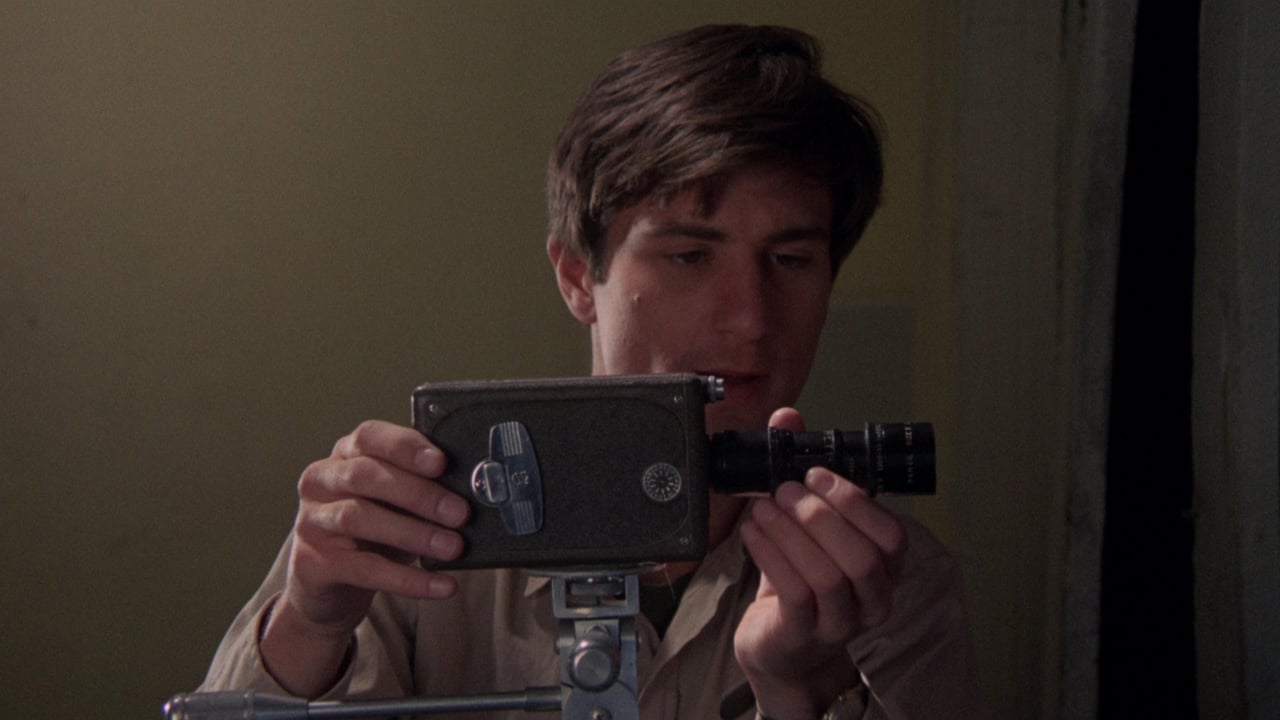

I would not categorize the films of Brian De Palma as being overly clever, witty, or even all that funny (attempts to be so usually just end up being cheesy). However, this early effort was all of the above, minus the cheese. Robert De Niro and Jennifer Salt are both fine, and there are numerous smaller roles whose performers all hit just the right notes in their delivery. The opening scene with Charles Durning as a slumlord trying to rent out a dilapidated apartment to De Niro is particularly amusing.There is also a potent (and, it must be said, somewhat misguided) radicalism to the film (which would not really reappear in De Palma's work until perhaps The Untouchables or, if not there, then certainly Casualties of War). De Niro's filmography after this work does not even come close to matching the political and social consciousness of Hi, Mom!, not even in The Deer Hunter which, like so much of De Niro's work, is mainly concerned with the personal and the psychological.Unfortunately, it is, as mentioned, a terribly misguided radicalism obsessed with race and the pitting of the middle and upper-middle class against the poor. Stopping people as they come off the subway in New York City and demanding to know if this or that person knows what it's like to be Black in America is a stupid question to ask in the first place, and yelling at a small business owner about how he's a cog in the machine of capitalism seems similarly wrongheaded (these people are victims of the beast of capitalism too in so far as they are just trying to make a living under a rotten system like everyone else). It is hard to say sometimes whether De Palma is for or against the anti-White racism of the "Be Black Baby" theater troupe (a cinema verite play put on by the troupe involves rape and murder, so it's unlikely he is fully committed to their politics), but a healthy alternative isn't presented either.Anyway, I would recommend checking this out. For a low budget film from 1970, the quality of the picture and sound is remarkably good.
... View MoreThis is definitely one weird movie, to understand,, taking place in Greenwich Village on the east side of Manhattan, in the 70's , it starts off with a guy trying to make a small budget porno, using nothing but a telescope, and a cheap camera. then the movie starts to go in a different direction. It goes into black power, and what it's like to be black in New York. then towards the end the movie goes yet in a different direction towards vigilanteism. this movie is not for the faint of heart or youngsters, sometimes in places this movie is very hard to watch specially the beginning,, it takes you into the mind of a Vietnam Vet, who comes back to Manhattan and rents out a cheap apartment, but the movie also grips you and doesn't want to let you go in the middle , where the have the Baby Be Black segment,, which is also hard to watch, but very interesting , nonetheless,, this was very early Deniro, when he was really young.. overall it was okay,, takes sometime to get use to.
... View MoreAn odd, cynical movie. And it puts a smile on my face.A young De Niro plays Jon Rubin, a single guy that wants to become a porn director. He's been spying on the all the neighbors in the local apartment building, and hatches a plan to make voyeur porn, filming the unwitting neighbors. Some smart dialogue and slightly corny humor develop, and a great cast makes it work wonderfully. One of the neighbors is a bearded young white fellow whose liberal politics are in overdrive. He's producing a play called "Be Black, Baby". The flyers promoting the show feature photos he's taken of white folks painted black. Seeing him pose for the camera, you can see that he is proud and excited- apparently he thinks that covering himself in black paint will immediately enable him to completely understand the plight of African Americans. And perhaps help purge whatever latent racism he has within. Nice goals, but a useless strategy. Cracks me up.Anyway, De Niro's porn career doesn't take off. He ends up trading in his camera for, embarrassingly, a television. And he ends up auditioning for Be Black Baby, playing the role of a cop. The play is a "guerrilla theatre" production, with actors interacting with audience, and designed to help races identify with one another. A bit slow at times, but it's pretty intense and realistic.The end of the play (now being shown on a television that Rubin is watching) shows the theatre troupe storming a middle class apartment complex, a flaccid attempt to spark revolution. The middle class tenants defeat the revolutionaries. Rubin can't take it, pulls out his gun, and fires at the television! His whole existence had been swallowed up by activism, and so he can't handle its failure.Flash to what is presumably several years later, and Rubin is now married with a kid on the way. His wife and he have inane conversations about his job and the color of the washing machine. His passionate idealism was fleeting, inevitably replaced by his surrender to the rat race.But then Rubin lights dynamite in his apartment complex, killing many people including his wife. People interviewed outside the wreckage aren't that disturbed, one man lamenting that his wallet was in there. And Rubin approaches the news camera because he wants to say hello to his mother.My description may make this sound like a dark movie, but (except for the play sequence) it really is a fun offbeat comedy. I even loved the music. Check it out!
... View More'Hi, Mom!' is supposedly a sequel to Brian De Palma's earlier 'Greetings', but the connections are a bit tenuous, even though Robert De Niro once again plays Jon Rubin. Is he the same character? I suppose so, but it's hard to say. Alan Garfield and Gerrit Graham also reappear. Garfield could well be the same guy, he's involved in pornography after all, but Graham is most definitely playing a different person. It's just one of many fascinating things about this unique movie, which is both funnier and darker than 'Greetings'. Rubin is a Vietnam vet who fancies himself a movie director, or maybe this is just an excuse to spy on the occupants of the building opposite. They include Graham, a radical involved in guerrilla theatre and the black power movement (there's a priceless moment where he paints himself black), and the sexy Judy (Jennifer Salt who subsequently co-starred in De Palma's breakthrough thriller 'Sisters'), who he decides to seduce (another classic scene). De Niro is on top form throughout, I really enjoyed his performance. Charles Durning has a hilarious bit at the beginning as the building Super, and cult fave Paul Bartel ('Eating Raoul') can be spotted if you keep your eyes open. The highlight of the movie is the brilliant 'Be Black Baby' sequence, which has to be seen to be believed. De Palma is a talented and versatile director who rarely gets the credit he deserves. Those who simplistically dismiss him as nothing but a Hitchcock rip-off would do well to watch 'Greetings' and 'Hi, Mom!' two of the most original and innovative American movies of the late 60s/early 70s. And Robert De Niro fans just have to see his work in these two movies, and I also recommend they check him out in Roger Corman's 'Bloody Mama' with Shelley Winters and Bruce Dern, and his small role in 'Born To Win' opposite George Segal. These all show that he really had something special going on before he teamed up with Scorsese.
... View More